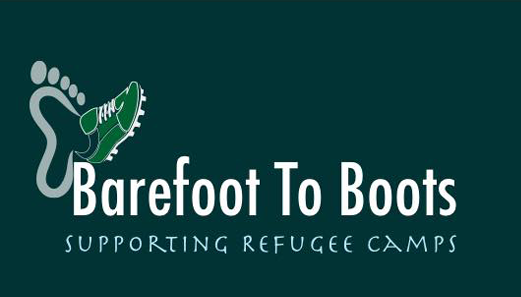Barefoot to Boots (BTB) is an Australian-based private sector NGO that supports refugees living in camps and their neighbouring host communities.
It was founded by brothers and former South Sudanese refugees, professional footballer Awer Mabil and Lost Boy Awer Bul, following their return in June 2014 with 20 football shirts to Kakuma Refugee Camp in northern Kenya, where both had lived before moving to Australia.
Soon after the trip, Awer Mabil approached businessman Ian Smith and spoke of the brothers’ dream to create a sustainable and ongoing project, based around football, to help refugees. Together, the brothers and Ian officially established 'Barefoot to Boots’, symbolising the long walk of many refugees, their basic needs and the importance of football in the foundation’s objectives.
Barefoot to Boots was officially launched in April 2015 by Australian Foreign Affairs Minister Julie Bishop and has since received wonderful support from the Australian Government, particularly through the generosity of the High Commission in Nairobi and the Department of Foreign Affairs and Trade.
BTB is largely funded by private sector and individual generosity, registered with full charitable and direct gift recipient status and has a wonderful Board of Directors. In January 2026 it appointed another former Kakuma Refugee, and lawyer, Daniel Ajak as Chair, taking over from Ian and reflecting the organisation’s commitment to refugees and acknowledgment that displaced people should be afforded the same opportunities as anyone else.
BTB is intent on helping to resource refugee camps and host communities as they strive to make their environments more sustainable, stimulating and accommodating for their residents. BTB returns regularly to Kakuma and neighbouring Kalobeyei, and has also visited camps in Uganda, Turkey and Lebanon. These countries and others neighbouring regions of significant conflict do so much of the hardest work to help the world’s displaced people.
At a time when many developed nations reduce humanitarian aid, BTB seeks to influence refugee policy at the highest levels of governments. It urges more support and assistance to give refugees more opportunity as well as alleviate some of the pressures on those host nations receiving displaced people and the NGOs providing on-the-ground assistance.
The stress is immense, with no signs of slowing. The latest UNHCR statistics reveal more than 130 million refugees and internally displaced people globally seeking a home through no fault of their own. In Kakuma and Kalobeyei there are nearly 300,000 refugees.
War, violence, climate change and general unrest have uprooted more men, women and children around the world than at any time in the seven-decade history of UNHCR. The crisis of forced displacement is staggering, as is the impact on the individuals caught up in it.
But just as refugees remain resilient and often positive, there is much we can do to be constructive to support refugees and to create the opportunities they deserve for their lives beyond the camps; particularly if we listen to the refugees themselves.
BTB is advised by those refugees in the camps, through meaningful and trusted discussions during visits and through engagement throughout the year on social media. Despite populist and uninformed beliefs, most refugees want to return to their places of origin once safety return. In the meantime, they want to be fulfilled enough to live in the camps and communities that host them, often over neighbouring borders.
At the core of BTB will always be football but emerging from its work since 2015 are health, education and gender equality initiatives that are making a difference.
BTB has donated more than 4000kg of boots and uniforms and it is common to see teams wearing the shirts of Australian football teams playing each other in the Kakuma Premier League or the women’s Divas League. With more than 400 teams of all ages, among the 300,000 refugees, there is an unrelenting demand.
However, it obviously could not simply be about football. Subsequent visits have highlighted the need for educational materials, medical supplies and sanitary products as well as sport, art and musical equipment.
BTB continues to give both in-kind donations and new equipment purchased in the host countries to support these other areas of need.
Evidence of this are the incubators, ultrasounds, laptops and books already sent to address some of these needs.
BTB develop our programs and donations to best match the needs of refugee camps with the particular focus or expertise of our corporate and personal supporters. In doing so we hope to build sustainable partnerships with our supporters and create the best outcomes for the camps.
Critically, BTB is further assisted and directed by NGOs that operate within camp and host community settings, and with which BTB has signed Memoranda of Understanding.
We have close working relationships with UNHCR, IRC (International Rescue Committee), LWF (Lutheran World Federation) and Peace Winds Japan. These trusted partnerships are a core component of the operations to ensure BTB meets the high standards of those same NGOs and delivers its resources and goods effectively in the best interests of refugees and donors alike.



